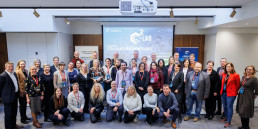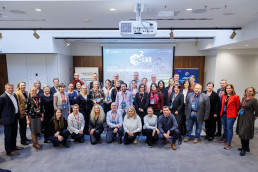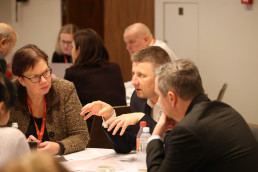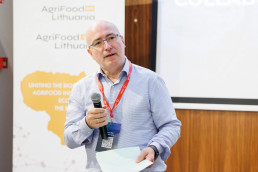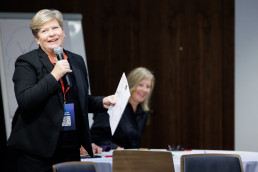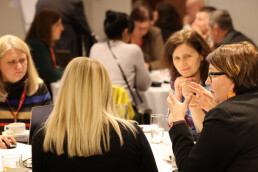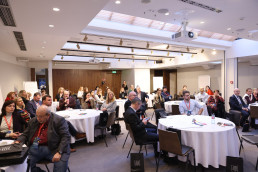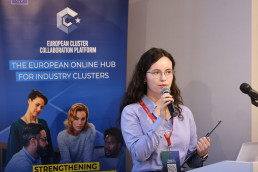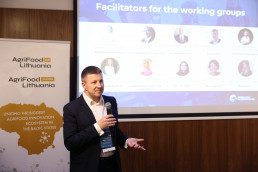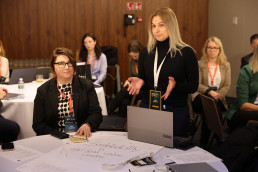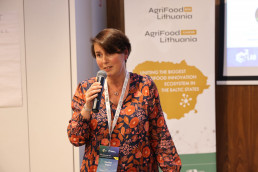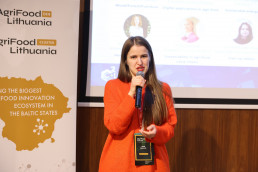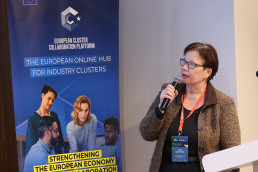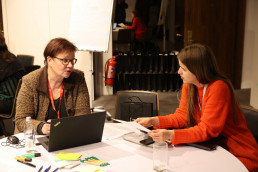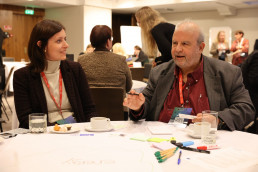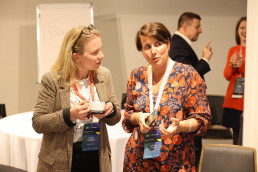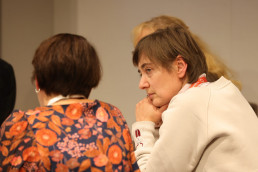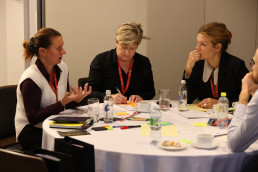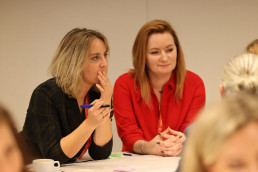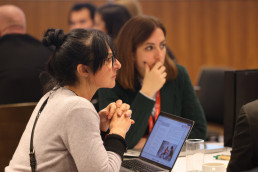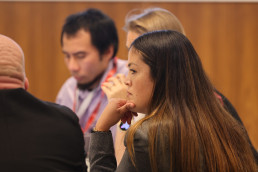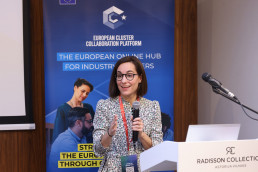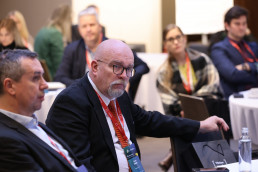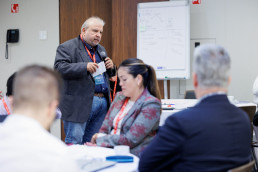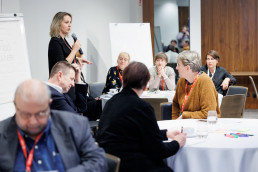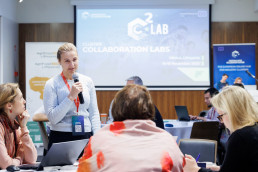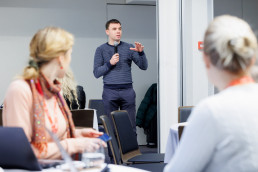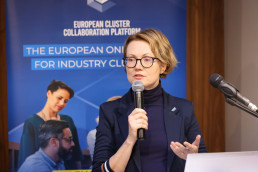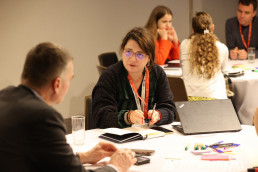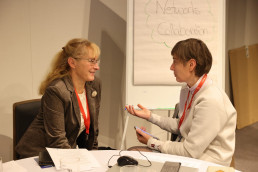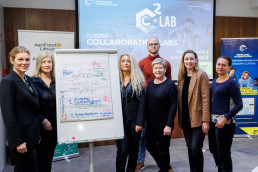On 14-15 November 2023, the European Cluster Collaboration Platform, in collaboration with AgriFood Lithuania, celebrated the fourth Cluster Collaboration Lab (C2Lab) in Vilnius, Lithuania. The workshop took place next to the AgriFood Forum, the largest forum on agri-food in the Baltic Region. The C2Lab supported the creation of new collaborations between the participants coming from Lithuania, Latvia, Hungary, Sweden, Finland, France, and Spain. They developed ideas to address the application of digital technologies for traceability in the agri-food sector, food waste, sustainability of agri-food value chains, sustainable energy, wood and furniture, and collaboration through networks, among others.
Among speakers: representatives of the EC and experienced Lithuanian and foreign clusters
The C2Lab was opened by Romualda Stragienė, Director at Innovation Agency Lithuania. She spoke about the achievements of the Lithuanian innovation ecosystem and the lack of globalness and cooperation which they try to address with events such as the C2Lab. Following her, Giedrius Bagušinskas from the Smart Food Cluster and Marta Batalla from DG GROW, European Commission, highlighted the need for importance of meeting the right people for future collaboration and the openness in the discussions to create business through clusters.
Athanasios Konstandopoulos, Chief Scientific Advisor of CHORUS, set the tone for this C2Lab by presenting the policy framework and challenges of the agri-food ecosystem. The EU Farm to Fork Strategy offers many opportunities for action to tackle the well-known challenges, which include climate change, water scarcity, soil degradation, increasing food prices, increasing demand for food, rise of antibiotic resistance, spread of zoonotic diseases, and loss of biodiversity.
With having resources available, now it is the right time to develop new projects. The current areas of research, development, and innovation are mainly centered around climate-smart agriculture, water-efficient agriculture, soil health, resilient food systems, sustainable aquaculture, precision agriculture, and alternative proteins. To establish the projects, A. Konstandopoulos presented the “Resource NEXUS” as an essential framework, focussing on sustainability and resilience. We must develop a holistic approach to address the challenges, bringing together talent, culture, regulations, density, and capital at the same time. In addition, we must search for synergies in multiple domains, namely education, research, innovation, and entrepreneurship.
Looking at potential funding sources for the project ideas, Marta Batalla from the European Commission gave an overview of EU programmes. She highlighted the key European priorities of the green and digital transition and building resilience as the basis for all funding programmes. The EU direct management programmes that are of particular interest of clusters are Horizon Europe (pillar II and pillar III), European Agricultural Fund, Single Market Programme, Programme for the Environment and Climate Action (LIFE), and the European Insititute of Innovation and Technology (EIT). The specific calls can be found on the EU Funding and Tenders Portal, the Cohesion Open Data Platform, and “Access to EU Finance” on Your Europe. She encouraged the participants to explore the different opportunities and pay attention to the call guidelines in order to submit a successful proposal.
Going deeper into Horizon Europe, Aiga Jonele from the National Contact Point of the Research Council of Lithuania gave a compelling speech about why the programme is for everyone. The National Contact Points, which are well-established networks in the Member States, work to reduce the stereotypes about Horizon Europe and give advice on administrative procedures. They can give personalized support and assistance on proposal writing. She highlighted the opportunities in the lump sum schemes, which are helpful simplification of the funding scheme. Viktorija Misėkaitė, advisor at the Ministry of Economy and Innovation of Lithuania, added on the usefulness of Horizon Europe. She explained how ERDF funds are being transfered to Horizon Europe to encourage greater participation, use the advantage of opportunities available for R&D&I, and have a holistic approach to foster innovation and ensure a critical mass of sustainable and uninterrupted flow of funding.
Develop clear ideas leading to practical results
After these inputs, the work on project ideas began. The participants formed eight groups on different topics related to agri-food, wood and furniture, energy, and networks. Each group was guided by a facilitator with experience in project development. They stirred the discussions to find synergies among the people in the groups and to determine a common goals that can unite them for new collaborations.
Groups started their work in the late afternoon and continued the whole morning on 15 November. As the last agenda point of the lab, each group presented their results to the plenary. Now, the ball is in the court of the participants to further develop these initial results and continue their newly founded collaboration. “C2Lab is a very good possibility to meet new people and prepare ideas for future proposals and cooperation”, said Armands Lejas-Krumins from Food Products Quality Cluster. “We have developed a great idea to address food waste, and we will continue our meetings in the next weeks and months to achieve concrete results. I hope this format will continue in the next years.”
Kristina Sermuksnyte-Alesiuniene from AgriFood Lithuania concluded: “In the agri-food industry, which is rife with shifting opportunities and challenges, C2Lab served as a model of collaboration and innovation. With the AgriFood Forum and this lab taking place in Vilnius, our attention is increasingly directed towards the development of influential initiatives and cross-border value chains. This C2Lab serves more than a gathering spot; it is a furnace in which concepts are refined into actionable plans. This event represents a dedication to revolutionizing the agri-food ecosystem through the utilization of the combined expertise of clusters, SMEs, policymakers, and innovators. As a collective, we are delineating a trajectory towards an agricultural sector that is robust, environmentally conscious, and affluent, thereby emphasizing the critical importance of agriculture to our societies and economies. May we seize this occasion to effect concrete change by capitalizing on the potential of cooperation to establish an environmentally conscious and groundbreaking future in the agricultural sector and other domains.”


